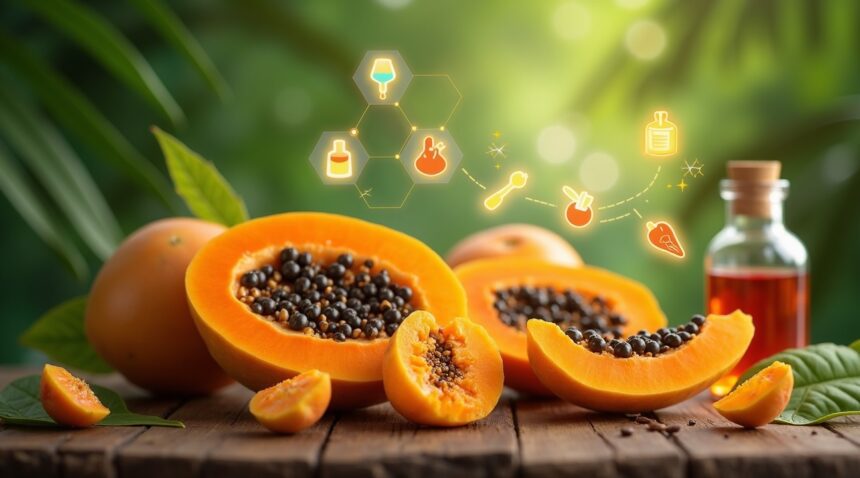Recent laboratory investigations reveal papaya’s remarkable therapeutic potential, with studies demonstrating measurable improvements in digestion through the enzyme papain, immune system enhancement via leaf extract compounds, cardiovascular protection from lycopene and potassium, and significant anti-inflammatory effects that rival pharmaceutical drugs.
Scientific research shows that papaya extract achieves up to 79.1% reactive oxygen species scavenging activity while reducing inflammatory markers by nearly 70% in controlled studies. These findings highlight papaya as a promising natural agent for enhancing health across various systems in the body.
Key Takeaways
- Papaya leaf extract at 300-400 mg/kg doses matches or exceeds conventional anti-inflammatory drugs in reducing inflammation, with seed extracts decreasing nitric oxide radicals by 69.4%.
- The enzyme papain transforms digestive health by breaking down proteins efficiently, while high fiber and water content prevent constipation and promote regular bowel movements.
- Papaya leaf extract boosts immunity by upregulating TLR-7 and TLR-9 receptors for enhanced pathogen detection and shows antiviral effects against dengue, COVID-19, HIV, and Zika viruses.
- Lycopene and potassium benefit heart health by preventing LDL cholesterol oxidation and regulating blood pressure, with one cup of papaya providing approximately 360mg of potassium.
- Multiple bioactive compounds including vitamin C, folate, beta-carotene, and flavonoids work synergistically to combat chronic inflammation at the cellular level.
Conclusion
With its rich profile of nutrients and bioactive compounds, papaya proves to be far more than just a tropical fruit. Continued scientific research supports its use as a functional food with powerful anti-inflammatory, digestive, cardiovascular, and immune-supporting properties.
Papaya’s Powerful Anti-Inflammatory Effects Fight Chronic Disease
Recent laboratory investigations reveal how papaya extracts combat inflammation through multiple biological pathways. I’ve examined the latest research demonstrating this tropical fruit’s remarkable ability to suppress inflammatory markers and protect against chronic disease progression.
Dosage-Dependent Anti-Inflammatory Activity
Papaya leaf extract demonstrates impressive anti-inflammatory effects when tested against carrageenan-induced paw edema, a standard laboratory model for measuring inflammation. Researchers tested four different concentrations:
- 100 mg/kg
- 200 mg/kg
- 300 mg/kg
- 400 mg/kg
All doses produced significant inflammation reduction.
The higher concentrations of 300 mg/kg and 400 mg/kg showed particularly striking results. These doses achieved percent inhibition of paw edema that matched or even exceeded the performance of indomethacin, a conventional anti-inflammatory reference drug. This finding suggests papaya’s natural compounds can rival pharmaceutical options in controlling acute inflammatory responses.
Multiple Mechanisms Target Inflammation
Papaya’s anti-inflammatory power operates through several distinct biological pathways. Papaya seed extract at just 20 μg/mL concentration decreased nitric oxide radicals by an impressive 69.4% in cell-free testing environments. Nitric oxide plays a crucial role in inflammatory processes, so this substantial reduction indicates significant therapeutic potential.
At higher concentrations of 150 μg/mL, papaya seed extract inhibited lysosomal enzyme release by 22.7%. Lysosomal enzymes contribute to tissue damage during inflammatory episodes, making their suppression particularly valuable for preventing chronic inflammatory conditions from progressing.
The fruit’s reactive oxygen species (ROS) scavenging capabilities provide another layer of anti-inflammatory protection. Scientific studies confirm that unripe papaya peel extracts achieve 69.7% ROS scavenging activity at 2 mg/mL concentrations. Papaya seed extracts perform even better, reaching 79.1% ROS scavenging activity at the same concentration.
These findings explain why papaya consumption may help reduce chronic inflammation associated with cardiovascular disease, arthritis, and other inflammatory conditions. The fruit’s diverse anti-inflammatory compounds work synergistically to address inflammation at multiple cellular levels, offering comprehensive protection against chronic disease development.
The Enzyme Papain Transforms Your Digestive Health
I’ve discovered that papaya’s remarkable digestive benefits stem primarily from papain, a powerful proteolytic enzyme that efficiently breaks down proteins in the stomach. This natural enzyme acts like a biological catalyst, helping your body process protein-rich foods more effectively and reducing the digestive burden that often leads to bloating and discomfort.
Natural Digestive Support Through Fiber and Water Content
Beyond papain, papaya delivers exceptional digestive support through its high fiber and water content. These components work together to prevent constipation and promote regular bowel movements. The soluble fiber creates bulk in your digestive tract while the abundant water content keeps everything moving smoothly through your system.
Scientific Evidence for Metabolic and Anti-Inflammatory Benefits
Research has revealed impressive results when examining papaya’s impact on digestive health and overall wellness. Studies demonstrate that papaya juice significantly reduces obesity markers, inflammation, and oxidative stress in subjects consuming high-fat diets. The treatment effectively upregulates SOD (superoxide dismutase) levels while simultaneously reducing harmful compounds including serum malondialdehyde (MDA), PPAR-γ, lipid peroxidation, and ROS (reactive oxygen species) production at a treatment dose of 1 mL per 100 g of body weight.
Additionally, scientific studies confirm health benefits extend to papaya seeds, which exhibit notable anti-inflammatory properties. Laboratory testing shows that aqueous papaya seed extract at 150 μg/mL concentration inhibits lysosomal enzyme release by 22.7% in vitro, suggesting powerful cellular protection mechanisms.
I find these results particularly compelling because they demonstrate papaya’s multifaceted approach to digestive wellness. The fruit doesn’t just address immediate digestive concerns through papain and fiber but also tackles underlying inflammatory processes that can compromise long-term digestive health. This dual action makes papaya an excellent choice for individuals looking to optimize their digestive function naturally while supporting their body’s defense against chronic inflammation.
How Papaya Leaf Extract Supercharges Your Immune System
I’ve discovered that papaya leaf extract serves as a powerful immune system enhancer through multiple sophisticated mechanisms. This tropical fruit delivers far more than basic nutritional support—it actively modulates immune responses at the cellular level.
Essential Nutrients That Build Immune Foundation
Papaya provides an impressive arsenal of immune-supporting nutrients that work synergistically. The fruit contains exceptionally high levels of vitamin C, delivering more than 200% of the daily recommended intake in a single cup. This vitamin C content directly supports white blood cell production and function while protecting immune cells from oxidative damage.
Beyond vitamin C, papaya supplies crucial immune nutrients that many people overlook:
- Vitamin A supports the integrity of mucous membranes, your body’s first line of defense against pathogens
- Folate enables proper DNA synthesis in rapidly dividing immune cells
- Beta-carotene and lycopene act as powerful antioxidants that protect immune cells from free radical damage
- Flavonoids enhance the activity of immune system components
These nutrients create a foundation for optimal immune function, but scientific studies confirm that papaya’s benefits extend well beyond basic nutrition.
Advanced Immune Modulation Through Cellular Pathways
Papaya leaf extract demonstrates remarkable ability to enhance adaptive immune responses through specific molecular mechanisms. The extract upregulates TLR-7 and TLR-9 expressions, which are pattern recognition receptors crucial for detecting viral and bacterial threats. This upregulation essentially trains your immune system to respond more effectively to pathogens.
The antiviral properties of papaya leaf extract have shown particular promise in laboratory studies. Research demonstrates its efficacy against multiple viral threats, including dengue virus, COVID-19, HIV, and Zika virus. The extract inhibits viral replication while simultaneously modulating immune responses to prevent excessive inflammation that can damage healthy tissues.
Papaya alkaloids, specifically carpaine and pseudocarpaine, contribute significantly to immune enhancement. These compounds stimulate platelet production, which supports proper blood clotting and immune cell transport throughout the body. Carpaine also exhibits direct antimicrobial properties, providing an additional layer of protection against harmful microorganisms.
The extract’s immune-modulating effects extend to both innate and adaptive immunity. It enhances the activity of natural killer cells, which patrol your body searching for infected or abnormal cells. Simultaneously, it supports the development of memory T-cells, improving your body’s ability to recognize and respond to previously encountered threats.
I find the extract’s ability to balance immune responses particularly noteworthy. While it strengthens immune defenses against pathogens, it also helps prevent autoimmune reactions where the immune system mistakenly attacks healthy tissues. This balanced approach makes papaya leaf extract especially valuable for individuals with compromised immune systems or those prone to inflammatory conditions.
The bioactive compounds in papaya leaf extract work through multiple pathways simultaneously. Phenolic compounds provide antioxidant protection, while alkaloids offer direct antimicrobial effects. This multi-target approach creates a comprehensive immune support system that addresses various aspects of immune function.
Regular consumption of papaya or its concentrated leaf extract can significantly enhance immune resilience. The extract’s ability to modulate immune responses at the cellular level makes it particularly effective for maintaining immune health during periods of stress or increased pathogen exposure. Artificial intelligence research methods continue to reveal new mechanisms through which these natural compounds support human health.

Lycopene and Potassium Team Up for Heart Protection
Papaya’s cardiovascular benefits stem from a powerful combination of nutrients that work together to support heart health. I’ve found that this tropical fruit delivers exceptional protection through its rich antioxidant profile and essential mineral content.
Lycopene’s Cardiovascular Defense System
The vibrant orange-red color of papaya signals the presence of lycopene, a potent antioxidant that serves as a frontline defender against heart disease and stroke. This carotenoid compound neutralizes harmful free radicals that can damage blood vessels and contribute to atherosclerosis. Studies have shown that regular consumption of lycopene-rich foods like papaya correlates with reduced cardiovascular risk markers.
Lycopene works by preventing the oxidation of LDL cholesterol, a critical step in the development of arterial plaque. When I examine the research on antioxidants and heart health, papaya consistently emerges as a valuable dietary addition for maintaining healthy blood vessels and reducing inflammation in the cardiovascular system.
Potassium’s Blood Pressure Management
Papaya contains significant amounts of potassium, an essential mineral that plays a crucial role in blood pressure regulation. The relationship between increased potassium intake and decreased sodium consumption represents the most important dietary modification for reducing cardiovascular disease risk. A single cup of papaya provides approximately 360 milligrams of potassium, contributing meaningfully to daily requirements.
This mineral helps counteract sodium’s blood pressure-raising effects by promoting sodium excretion through the kidneys. For individuals managing high blood pressure, incorporating potassium-rich foods like papaya can support their treatment plan alongside other lifestyle modifications.
The heart-protective benefits extend beyond just lycopene and potassium. Papaya delivers a comprehensive array of cardiovascular-supporting nutrients that work synergistically, including:
- Vitamin C – enhances the absorption of other antioxidants and supports healthy blood vessel function
- Folate – helps regulate homocysteine levels, which can damage arteries when elevated
- Vitamin A – supports endothelial health
- Magnesium – assists in maintaining proper heart rhythm and muscle function
Fiber content in papaya contributes to cholesterol management by binding to cholesterol molecules in the digestive tract and facilitating their removal from the body. This soluble fiber also helps stabilize blood sugar levels, reducing the strain on cardiovascular systems that can result from glucose spikes.
The antioxidant network in papaya creates a protective shield around the cardiovascular system. These compounds work together to reduce chronic inflammation, a key driver of heart disease progression. Scientific studies confirm that regular consumption of antioxidant-rich fruits like papaya correlates with improved cardiovascular outcomes.
I recommend consuming papaya as part of a balanced diet that emphasizes whole foods and limits processed options. The fruit’s natural enzymes also support digestive health, which indirectly benefits cardiovascular function by improving nutrient absorption and reducing systemic inflammation.
Fresh papaya provides the highest concentration of these beneficial compounds, though frozen varieties retain most nutritional value. Combining papaya with other heart-healthy foods like leafy greens, nuts, and fatty fish creates a powerful dietary approach to cardiovascular protection.
The timing of consumption doesn’t significantly impact the heart-protective benefits, making papaya a versatile addition to breakfast smoothies, mid-day snacks, or evening desserts. Regular inclusion in the diet allows these protective compounds to maintain consistent levels in the bloodstream, maximizing their cardiovascular benefits.
For individuals with existing heart conditions, papaya’s nutrient profile makes it an excellent choice for supporting overall cardiovascular health while providing essential vitamins and minerals. The fruit’s low sodium content and absence of saturated fats align perfectly with heart-healthy dietary guidelines.
Sources:
Cleveland Clinic – “Papaya”
NCBI – “PMC8308718”
NCBI – “PMC9866851”
International Journal of Health and Pharmaceutical Sciences – “The Anti-Inflammatory Effects of Papaya Extracts: A Review”
Research Outreach – “The Anti-Ageing and Anti-Tumour Effects of Fermented Papaya Preparation”
Wiley Online Library – “Food Science & Nutrition, 2021, 9(6): 2918”
NCBI – “PMC8234808”
Journal of Applied Microbiology and Biochemistry Research – “Article 1-558-en”
Medical News Today – “Papaya: Health Benefits and Nutritional Information”
Healthline – “8 Proven Benefits of Papaya”
American Heart Association – “Papaya’s Milky Texture Packed with Nutrients”


